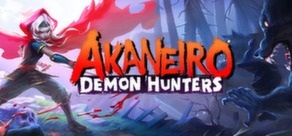 Sad news from American McGee’s Akaneiro: Demon Hunters Kickstarter campaign; things aren’t going well.
Sad news from American McGee’s Akaneiro: Demon Hunters Kickstarter campaign; things aren’t going well.
First some history; the Akaneiro Kickstarter campaign ran during January of 2013 and raised $204,680 of a $200,000 goal. The game, an isometric action RPG that mixed Japanese themes into the world of Little Red Riding Hood, was nearly two years into development by the time the campaign started. Under a section ironically titled “Your backing will guarantee we can include the following” American and his team stated they needed the money for porting the game to mobile and Linux, adding Co-op multiplayer, adding an equipment crafting system, and improved community support. Seems reasonable, if expensive.
Fast forward to last night, American posted the following update to backers:
“A little history and an update regarding Akaneiro development going forward: Development on Akaneiro started during the early months of 2011. Since that time, we’ve maintained a development team averaging 15 people/month on the project. In total, around 360 man-months have gone towards development, bringing our investment in dollars to nearly $2 million USD. In that same period, we’ve generated roughly 300kUSD in revenue – this includes funds collected via the Kickstarter campaign, F2P purchases in-game, and one-time purchases via Steam. In simple math: We’ve spent $2 million, we’ve made $300k, we’re “in the hole” $1.7 million.”
So far it doesn’t sound promising, but how does this affect Akaneiro? American continues:
“Given this situation, we now have no choice but to radically alter the approach we’re taking to maintaining and improving the game. The core development team has been reduced in size to just two people. They will continue to address bugs and make improvements while working towards goals like multi-player and tablet support, but progress will be slower. Depending on the success of our other remaining title, The Gate, we may one day find ourselves in a position to throw greater resources at Akaneiro. We certainly hope that will be the case.”
American then discusses the challenges that come with being an independent developer, and how the team has dealt with these sorts of challenges in the past. The different between those previous situations and this one, American states, is that he’s being much more forthcoming with the challenges being faced due to the transparency that should ideally be part of any Kickstarter. American closes the somewhat depressing note:
“And please, continue to keep the discussion going here on Kickstarter. We’re listening, we care, and we’re excited about your involvement in the future of Akaneiro and our other projects.”
So what about those additions mentioned earlier? The game got its crafting, community support seems great, and it was released on Linux. Unfortunately two of the biggest changes, multiplayer and the mobile port, have not been completed. While the backer comments don’t involve the usual screams of fraud, they’re not entirely kind. A number of backers have resorted to “the game sucked anyway” style name calling, and lamenting the fact that the backer goods do not hold the same value as the pledge amount.
 Through it all American has been extremely active in responding to questions and criticisms with a cool head and detailed information.
Through it all American has been extremely active in responding to questions and criticisms with a cool head and detailed information.
The Akaneiro Kickstarter might be a cautionary tale that things don’t always go according to plan, even in the hands of the most experienced of developers; but it should be looked to for what to do when things go wrong. Grace, professionalism, teamwork, and transparency are what can make crowd funding so great, it’s not always just about getting the game you hoped for.
We wish American, his team, and the Akaneiro backers, the best.
If you’d like to give Akaneiro: Demon Hunters a try you can purchase it from Steam Early Access for $9.99, or play it on the Spicy Horse website for free.



